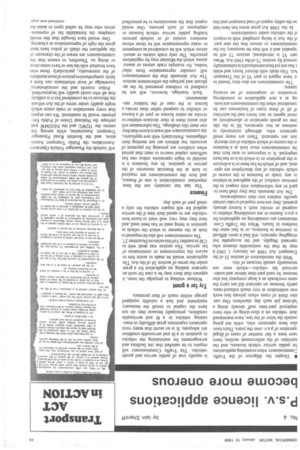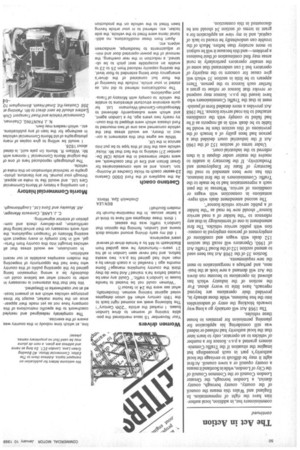P.s.v. licence applications become more onerous
Page 51

Page 52

If you've noticed an error in this article please click here to report it so we can fix it.
No. 4 by lain Sherriff
II Despite the diligence of the Traffic Commissioners when examining applications For public service vehicle licences, and the activities of the enforcement section, there lave been a fair number of cases of illegal operation of p.s.v. over the years. There have also been operators who, while not going 3utside the letter of the law, have maintained their vehicles on a shoe-string or who have Nnployed part-time staff already doing a 1111-time job each day elsewhere. One can also think of cases where private hire work was undertaken at very much reduced rates, partly because an operator did not carry the same overheads as a large company but also because he used part-time labour and underserviced his vehicles—whichp were not necessarily unsafe because of this.
With the introduction of section 35 of the Transport Act 1968 on January 1 1969 it may be that the undesirable element who operated illegally, and the acceptable but struggling operator, will find it more difficult to continue in business, or in fact enter the business in future. When the Traffic Commissioners are considering an application for a p.s.v. licence or are considering whether to suspend or revoke such a licence already granted, they are now required to take certain specific matters into their consideration.
The Act demands that they shall have regard to any information with respect to the previous conduct of the applicant in relation to any trade or business in the course of which vehicles of any description are operated, and of which he has been or is a director N the proprietor or in which he is or has been employed. It is important to note here that :he commissioners must look at a business
n the course of which vehicles of any descripion are operated. There are many small operators who, although extensively in ausiness as bus operators, fill in the idle :ime on goods operation or alternatively as ravel agents or taxi hirers and the activities of all of these types of businesses can be -xinsidered when the commissioners are lookng at a new application or considering -evocation or suspension of an existing icence.
The commisioners are also duty bound to
o have regard to part VI of the Transport kct. This deals with drivers' hours and while t has not yet been introduced iris substantially :overed by section 73 of the 1960 Act. When oart VI is introduced, section 73 will be -epealed and it will then be necessary for the ommissioners to ensure that the new part )f the Act is being complied with in respect )f the vehicles under consideration.
In the 1968 Act great stress has been laid on the safety aspect of road transport and this is equally true of public service and goods vehicles. The Traffic Commissioners will require to be satisfied that the facilities and arrangements for maintaining the vehicles in question in a fit and serviceable condition are adequate. It is no secret that many rural operators experience great difficulty in maintaining vehicles in a fit and serviceable condition, principally because they do not have the capital to install the necessary equipment and lack a suitably equipped garage within reach of their premises.
Try for a grant
Without wishing to prejudge the issue, it appears that there may be a case for such an operator making an application for a grant under the terms of section 34 of the Act. The application would be made to assist him to secure the improvement or continuance of his service. This section was dealt with in CM in number 3 o f th is series on December 27.
The commissioners will also be-required to look at the manner in which the vehicle in question is being used or has been used, and here they may very well want to know how vehicles are to spend their time if the service applied for will require vehicles for only a small part of each day.
Finance
The last but certainly not the least important consideration is one of finance, and here the commissioners are required to look at the financial resources of the person in question. In any business it is suicidal to begin operations unless one has sufficient capital reserve to meet that period when creditors are pressing for payment of accounts but debtors are not meeting their obligations. Particularly with new applicants, the commissioners will want to know that they can meet this challenge. This information will also assist them in their decision whether to revoke an entire licence or part of a licence or whether to suspend rather than revoke a licence in the case of the holders' misdemeanour.
Such hearings, however, will not be confined to evidence presented by the applicant and perhaps the enforcement section. The Act demands that the commissioners will consider representation from other bodies, for example trade unions or associations which the Minister may by regulations prescribe. The only trade unions or associations which will be considered as competent to make representation will be those whose members consist of or include persons holding public service vehicle licences or employees of such persons. One would expect that the associations to be prescribed will include the Passenger Vehicle Operators Association, the Public Transport Association, and the Scottish Road Passenger Transport Association, while among the unions the TGWU and the NUGMW and perhaps the National Union of Public Employees would be numbered. We can expect that every association or trade union which might qualify under terms of the Act will ask the Minister to be considered but it is unlikely that all who could qualify will be prescribed.
Police records and the constabularies' knowledge of local inhabitants can form a fairly comprehensive picture of most members of the community, particularly those who have brushed with the law or have come close to doing so. Therefore, to ensure that the commissioners are aware of the character of the applicant the chiefs of police have been given the right of representation at a hearing.
One would have thought that this would complete the formidable list of representatives who may be called upon to assist the commissioners but, in addition, local authorities have the right of representation. In England and Wales this means the council of the county, county borough, county district, a London borough, the Greater London Council or the Common Council of the City of London, while in Scotland it means a county council or a town council. At first sight it may be difficult to envisage the local authority's part in such proceedings but imagine the situation if the Traffic Commissioners granted a p.s.v. licence for a number of vehicles to an operator, only to learn later that the local authority had refused or indeed was still considering his application for planning permission for premises to house these vehicles.
The 1968 Act will certainly go a long way towards blacking the entry of undesirables into the bus business, while those already in, provided their operations are beyond reproach, have little to worry about. For the section of the industry which has allowed its operations to become run down the Act will demand a new look at the business, and perhaps a reorganization to meet the new requirements.
Section 35 of the 1968 Act has been used to amend section 152 of the Road Traffic Act of 1960.. Operators will recall that section 152 deals with wages and conditions of employment of persons employed in connection with public service vehicles. The first amendment is one of terminology in that any reference to "the holder of a road service licence" should now be read as "the holder of a public service vehicle licence".
The second amendment deals with representations, in connection with wages or conditions of service. Whereas in the past such a representation had to be made to the Traffic Commissioners in the first instance, this has now been amended to read the Secretary of State for Employment and Productivity. If the Secretary is unable to resolve the matter under dispute it is then referred to the industrial court.
Under terms of section 152 of the 1960 Act if the industrial court decided that a person had been guilty of a breach of the provisions of this section then he would be liable to be dealt with in all respects as if he had failed to comply with the conditions attached to his road service licence. The 1968 Act provides a more detailed form of punishment in that the Traffic Commissioners who have issued the p.s.v. licence may suspend or revoke that licence or refuse to grant a further such licence to the person. There appears to be little in section 35 which will give cause for concern to the majority of operators but I can understand that some of the smaller operators particularly in rural areas may find continuation of their business a problem—and this because it will be subject to more scrutiny than before. Much of the trouble can undoubtedly be traced to lack of capital, and in my view an application for a grant in terms of section 34 should not be discounted in this connection.








































































































